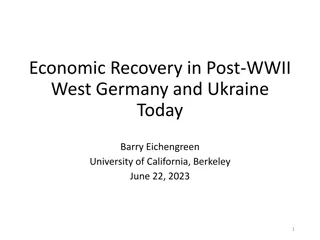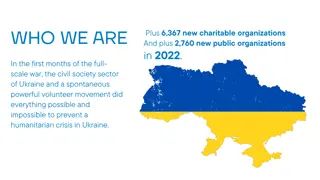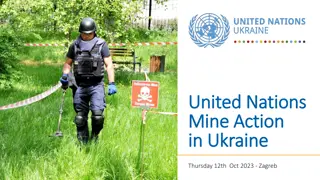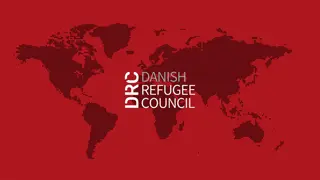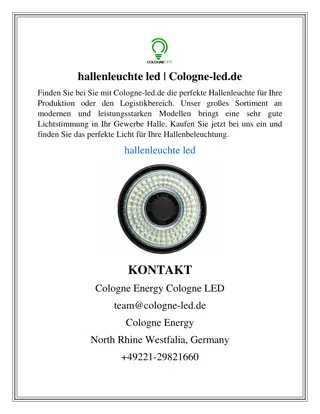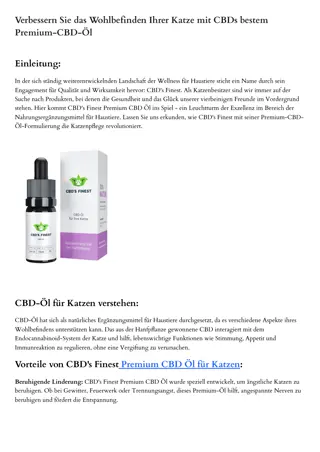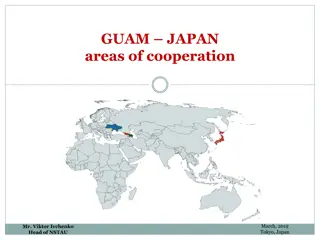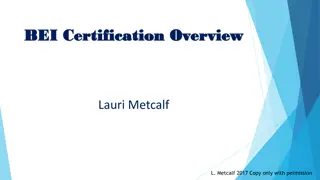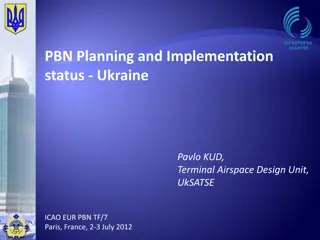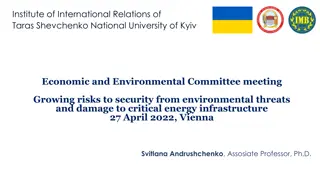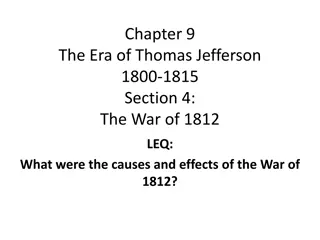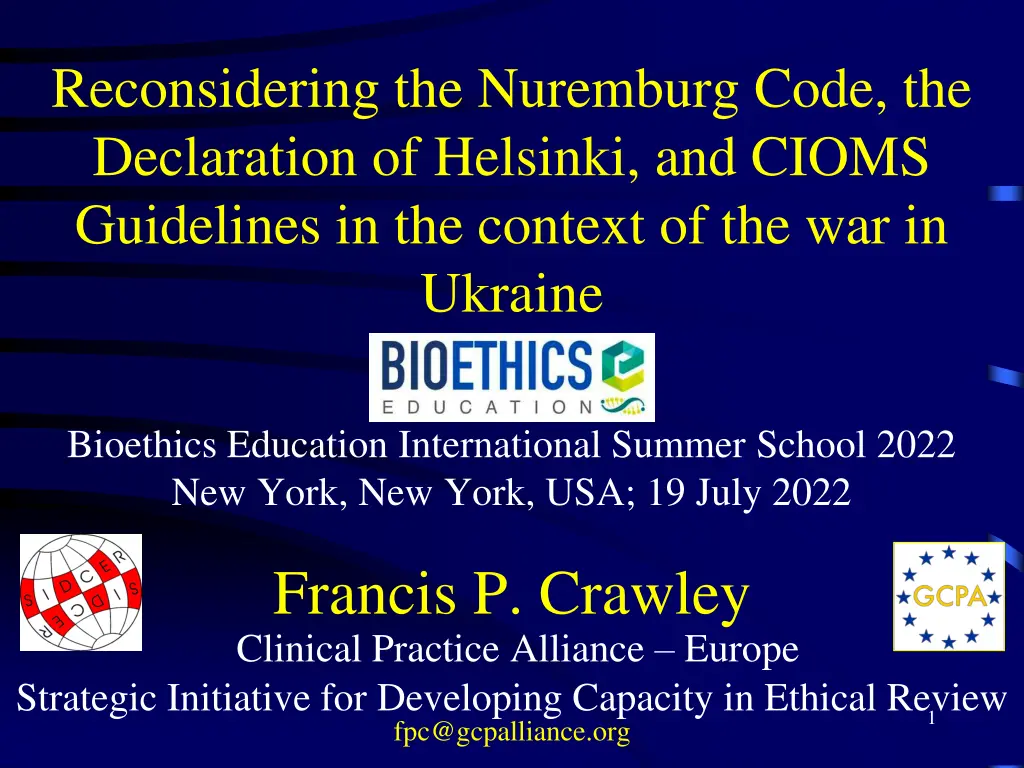
Exploring Bioethics in Modern Context: Insights from Nuremberg Code and Helsinki Declaration
Delve into the contemporary relevance of the Nuremberg Code, Helsinki Declaration, and CIOMS Guidelines in the context of the ongoing conflict in Ukraine. Join the Bioethics Education International Summer School 2022 in New York for in-depth discussions led by Francis P. Crawley and other esteemed professionals in the field. Explore the evolution and impact of bioethics, recognizing its fluid nature shaped by public discourse. Engage in critical reflections on the achievements and shortcomings of bioethics in addressing ethical dilemmas across diverse disciplines.
Download Presentation

Please find below an Image/Link to download the presentation.
The content on the website is provided AS IS for your information and personal use only. It may not be sold, licensed, or shared on other websites without obtaining consent from the author. If you encounter any issues during the download, it is possible that the publisher has removed the file from their server.
You are allowed to download the files provided on this website for personal or commercial use, subject to the condition that they are used lawfully. All files are the property of their respective owners.
The content on the website is provided AS IS for your information and personal use only. It may not be sold, licensed, or shared on other websites without obtaining consent from the author.
E N D
Presentation Transcript
Reconsidering the Nuremburg Code, the Declaration of Helsinki, and CIOMS Guidelines in the context of the war in Ukraine Bioethics Education International Summer School 2022 New York, New York, USA; 19 July 2022 Francis P. Crawley Clinical Practice Alliance Europe Strategic Initiative for Developing Capacity in Ethical Review fpc@gcpalliance.org 1
The Vantage Point EU GCP Dir/Reg and Paediatric Regulation Chair WG, Guidelines and Recommendations for European Ethics Committees (Brussels 1995/7) Past member UNAIDS ERC Chair, WHO WGs on Guidelines for Ethics Committees & DSMBs Co-founder, FERCAP & SIDCER CIOMS Member Past Member, WHO GCP & ICTRP Committees Past Member, EORTC IRB; Chair, INCTR EC Member, EWG, European Academy of Paediatrics Co-founder, European Network for Research on Alternating Hemiplegia (ENRAH) EUROSOCAP, ENCCA, nEUroped, RESPECT, EBC 2
Current Activities Established in 2000 PREP - Preparedness Planning for Clinical Research During Public Health Emergencies in response to the SARS-CoV-2 pandemic Ambassador for Ethics and Law, European Open Science Cloud (EOSC) Future Chairman, EOSC Future / RDA Artificial Intelligence and Data Visitation Working Group (RDA AIDV-WG) & Member, COVID-19 Legal & Ethics Sub-Working Group Chairman, International Data Policy Committee (IDPC) & Member, Executive Committee, International Committee on Data (CODATA), International Science Council (ISC) Member, Regulatory and Ethics Work Stream (REWS), Global Alliance for Genomics and Health (GA4GH) Research Data Publishing Ethics Working Group, FORCE11 & The Committee on Publication Ethics (COPE) Member of the Data Stewardship Working Group, Virus Outbreak Data Network (VODAN) GO-FAIR
The Achievements and Shortcomings of Bioethics Bioethics is a multi-disciplinary field. Ultimately, its boundaries and impact are determined by the public. Bioethics is not a privileged domain; it is a continually evolving discussion. Principles, rules, and regulations are moments of focus (fixture) in the discussion. They, however, cannot determine the discussion. To engage in a discussion on the boundaries of human activity is to engage in the discussion of (bio)ethics. 4
Science and Ethics As Situated Engagements How do we value science from the perspective of its contribution to (or detraction from) the dignity of persons? This question, the research ethics question, requires a situated response. The principles of ethics, however and by whomever defined, are situated and dependent upon the context of their application for their validity.
The Ukraine Clinical Research Support Initiative (UCRSI) Objectives 1. development of a structure ongoing situational analysis of the current clinical trials in Ukraine; 2. establishment of reliable communication and information channels; 3. provision of support information for displaced clinical trial participants, personnel, and scholars; 4. development of specific guidance for addressing clinical trials during and following wartime: Good Clinical Practice Guidance; Ethics Review Guidance; and 5. planning for the reconstruction of Ukraine s and the region s clinical trial infrastructure/enterprise following the ending of the war.
Recent Publications (1) 1. Kurihara, Chieko, et al. The continuation of clinical trials in times of war: A need to develop ethics and situationally adaptive clinical research guidelines . Section: Regulatory Science: Frontiers in Medicine. (under review). 2. Kerpel-Fronius, Sander, et al. The ethical responsibility to continue investigational treatments of research participants in situation of armed conflicts, economic sanctions or natural catastrophes . Section: Regulatory Science: Frontiers in Medicines. Accepted. 3. Crawley, Francis P., Beate Aurich, Chieko Kurihara, and Kotone Matsuyama. Perspectives on Clinical Trials During Times of War: The Situation of Ukraine . IFAPP Newsletter. May 2022. 4. Buergi, Birgit R., et al. Calling for unity, solidarity, continuity, and access-oriented action in times of war. Editorial. Pharmaceutical Medicine.
Recent Publications (2) 6. Crawley, Francis P., Beate Aurich, Birgit Buergi, Vikroriia Dobrova, Perihan Elif Ekmekci, and Valerya Sokolchik. Science, medicine, and ethics in times of war . BMJ 2022; 377 doi: https://doi.org/10.1136/bmj.o932 (Published 11 April 2022) Cite this as: BMJ 2022;377:o932 Originally published in a long version as a Response to: Russia s war: Why The BMJ opposes an academic boycott. BMJ 2022; 376 doi: https://doi.org/10.1136/bmj.o613 (Published 10 March 2022) Cite this as: BMJ 2022;376:o613 7. Crawley, Francis P. The limitations of scientific evidence when speaking truth to politics. BMJ 2022; 376 doi: https://doi.org/10.1136/bmj.o732 (Published 22 March 2022) Cite this as: BMJ 2022;376:o732; originally published as a Response to: Waters, Adele. Covid-19: Show us evidence for lifting restrictions, doctors tell Johnson . BMJ 2022; 376 doi: https://doi.org/10.1136/bmj.o383 (Published 15 February 2022) 8. Crawley, Francis P. Against a General Medical Council (GMC) required course in medical ethics Response to: Sokol, Daniel. When is the best time to teach medical ethics? BMJ 2022; 376 :o504 doi: https://10.1136/bmj.o504 (Published 28 February 2022)
Framing Questions 1. What is the relationship between science and medicine? 2. What is the relationship between science and ethics? 3. What is the relationship between science and politics? 4. What is the value of science (clinical research) to individual healthcare, public healthcare, education, and society generally? 5. Wherefore ethics post-Covid, post-Russia/Ukraine?
Questions Arising 1. How do we address clinical research in a country or region where there is a significant number of ongoing clinical trials and conflict, war, economic hardship (e.g., sanctions, or natural catastrophes occur? 2. How do we apply ethics principles and ethics judgements to questions of science, questions of medicine, and questions arising external to the research enterprise?
The Nuremberg Code The Nuremberg Trial: The Doctors Trial USA vs. Karl Brandt et al. (23 defendants) December 1946 August 1947 Charges were war crimes (also, conspiracy, crimes against humanity, membership in a criminal organization) The German Guidelines for Human Experimentation (1931) and the Berlin Code enacted by the Prussian Government (1900) Principle authors: Leo Alexander (6 points on ethical and non-ethical medical research), Andrew Ivy, Herold Sebring 11
Andrew C. Ivy to Maurice H. Pappworth (Human Guinea Pigs) Ivy to Pappworth. Letter 6 April 1966, London: PP/MHP/C5 Wellcome Library. I might add that I accepted the invitation to serve at the Nurenberg [sic] Trials only because I had in mind the objective of placing in an international judicial decision the conditions under which human beings may serve as subjects in a medical experiment, so that these conditions would become the international common law on the subject. Otherwise I would have had nothing to do with the nasty and obnoxious business. I believe in prevention, not a punitive cure The Judges and I were determined that something of a preventative nature had to come out of the Nurenberg Trial of the Medical Atrocities . (See link.) 12
The Aim of the Code To define Permissible Medical Experiments Consent (personal autonomy) Sound science Avoidance of suffering and damage Risk vs. humanitarian importance 13
The Role of the Code We find from the evidence that in the medical experiments which have been proved, these ten principles were much more frequently honored in their breach than in their observance. . . . Obviously all of these experiments involving brutalities, tortures, disabling injury, and death were performed in complete disregard of international conventions, the laws and customs of war, the general principles of criminal law . . . . 14
Advice of the Health Council 10 October 1955, The Netherlands It is clearly neither the scientific questioning nor the experimental character that serves as the basis of acceptability but rather the intervention (or interventions). In all of these sorts of interventions the question arises acceptable or not acceptable and the Committee has decided that it is its task to provide criteria. 15
The Limits of the Bioethics in Medical Science . . . the Commission wishes to state, with great emphasis, that the methods of the natural sciences are accepted as responsible and that they have demonstrated their value for science and humanity, especially in the last 50 years. They require no defense . . . . . . . wenst de Commissie met grote nadruk te verklaren dat de natuurwetenschappelijke methoden vooral in de laatste vijftig jaar als verantwoord zijn aanvaard en dat zij hun waarde voor wetenschap en mensheid hebben bewezen. Zij behoeven geen verdediging . . . Advies van de Gezondheidsraad (NL) 10 oktober 1955 16
How should we understand the Declaration of Helsinki in 2022? (a philosophy ?) a set of principles ? a guideline ? a standard ? a regulation (law) ? 17
What is the World Medical Association? Founded 1947 in Paris, 27 medical associations represented, including AMA Located in Ferney-Voltaire, France (close to Geneva, Switzerland, 1975-present) (1964-1974 headquartered in New York City) Currently 115 member (94 in 2013) national medical associations Constituent members national associations of physicians Association members individual physicians 18
WMA raison dtre Created: to ensure the independence of physicians, and to work for the highest possible standards of ethical behaviour and care by physicians, at all times. (particularly in light of the role of physicians in WWII) Purpose: to serve humanity by endeavoring to achieve the highest international standards in Medical Education, Medical Science, Medical Art and Medical Ethics, and Health Care for all people in the world 19
The Declaration of Helsinki Adopted by the WMA General Assembly in Helsinki 1964 Recommendations Guiding Physicians in Clinical Research Work begun on the drafting in 1953 Part of an ongoing discussion on research ethics New WMA Working Group on the Declaration of Helsinki (DoH) established by the 220th WMA Council Session, Paris, April 2022:United States (Chair), China, Bangladesh, Belgium, Brazil, Denmark, Finland, Germany, Israel, Italy, Japan, Malaysia, Netherlands, Nigeria, South Africa, Taiwan, United Kingdom, Uruguay, Vatican and Associate Members 20
The Role of the Declaration of Helsinki the cornerstone of research ethics (FP Crawley, WMA General Assembly, Helsinki, 2001) the international touchstone for the ethical conduct of clinical studies (Peter Lurie & Sidney Wolf, Public Citizen s Health Research Group, Letter to David Lepay, FDA, September 1, 2004) 21
The Role of the Physician 3. The Declaration of Geneva of the WMA binds the physician with the words, The health of my patient will be my first consideration, and the International Code of Medical Ethics declares that, A physician shall act in the patient s best interest when providing medical care. (DoH, 2013)
Xenophon Memorabilia Socratis, 4.2 Who do you think knows himself the man who merely knows his own name, or the one who behaves like people buying a horse? They don t consider that they know a horse in which they are interested until they have satisfied themselves whether it s obedient or disobedient, strong or weak, swift or slow, and how it stands with respect to all the other qualities which make a horse desirable or undesirable as regards its usefulness; and the man [doctor] I am thinking of has in the same way ascertained his own ability by examining his own qualifications in respect of human relationships.
The Cornerstone of Health Research Ethics It is the mission of the physician to safeguard the health of the people. His or her knowledge and conscience are dedicated to the fulfilment of this mission. (DoH 1964-1996, Introduction) 24
The Cornerstone of Health Research Ethics It is the duty of the physician to promote and safeguard the health of the people. His or her knowledge and conscience are dedicated to the fulfilment of this duty. (DoH 2000, Intro, Paragraph 2) 25
The Cornerstone of Bioethics 4. It is the duty of the physician to promote and safeguard the health, well-being and rights of patients, including those who are involved in medical research. The physician s knowledge and conscience are dedicated to the fulfilment of this duty. 26
Revisiting The Ground of Ethics In medical research involving human subjects, the well-being of the individual research subject must take precedence over all other interests. Declaration of Helsinki 2008, paragraph 8 an acknowledged internal inconsistency aspirational (2013) 27
Helsinki (draft revision, 9 November 2007) 5. In biomedical research on human subjects beings, considerations related to the well-being of the human subject individual should take precedence over the interests of science, and society and the sponsors of research. 28
The Ground of Helsinki In biomedical research on human subjects, considerations related to the well-being of the human subject should take precedence over the interests of science and society 2000, paragraph 5 In medical research involving human subjects, the well- being of the individual research subject must take precedence over all other interests. Declaration of Helsinki 2008, paragraph 8 Medical progress is based on research that ultimately must include studies involving human subjects. 2013, paragraph 5 29
Vulnerable Populations 19. Some groups and individuals are particularly vulnerable and may have an increased likelihood of being wronged or of incurring additional harm. All vulnerable groups and individuals should receive specifically considered protection. 20. Medical research with a vulnerable group is only justified if the research is responsive to the health needs or priorities of this group and the research cannot be carried out in a non-vulnerable group. In addition, this group should stand to benefit from the knowledge, practices or interventions that result from the research. Declaration of Helsinki 2013 30
Helsinkis Own Authority (1964) It must be stressed that the standards as drafted are only a guide to physicians all over the world. Doctors are not relieved from criminal, civil and ethical responsibilities under the laws of their own countries. Declaration of Helsinki 1964, Introduction 31
Helsinkis Own Authority (2008) Although the Declaration is addressed primarily to physicians, the WMA encourages other participants in medical research involving human subjects to adopt these principles. Declaration of Helsinki 2008, paragraph 2 Physicians should consider the ethical, legal and regulatory norms and standards for research involving human subjects in their own countries as well as applicable international norms and standards. No national or international ethical, legal or regulatory requirement should reduce or eliminate any of the protections for research subjects set forth in this Declaration. Declaration of Helsinki 2008, paragraph 10 32
Helsinkis Own Authority (2013) Preamble 1. Declaration of Helsinki as a statement of ethical principles for medical research involving human subjects, including research on identifiable human material and data. The Declaration is intended to be read as a whole and each of its constituent paragraphs should be applied with consideration of all other relevant paragraphs. 2. Consistent with the mandate of the WMA, the Declaration is addressed primarily to physicians. The WMA encourages others who are involved in medical research involving human subjects to adopt these principles. The World Medical Association (WMA) has developed the
CIOMS International Ethical Guidelines for Health-Related Research Involving Humans 2016 The aim of the guidelines is to provide internationally vetted ethical principles and detailed commentary on how these principles should be applied [T]he scope of the guidelines has been broadened from biomedical research to health- related research because the term biomedical research would not cover research with health-related data. As research practice changes,new challenges emerge and guidelines need to be adapted. See this link.
Ukraine Clinical Trial Challenges 1. Patients The physician s duty to the patient / research participant in conflict situations Access to medicines, including access to trial medicines Access to ongoing clinical trial care and follow-up Relocation of patients to new study sites, to new treatment plans Participants developing war-related co-morbidities that could complicate analysis of study data (e.g., wounds, loss of ambulation, drug/alcoholic abuse, PTSD, cognitive impairment) Research on the war wounded, soldiers and captives Challenges and solutions for monitoring trial participants for adverse drug reactions during armed conflict
Ukraine Clinical Trial Challenges 2. Regulatory Specific regulatory guidance for clinical trials preparation for, and response to, conflict situations Guidance on monitoring the emergency use of unregistered and experimental intervention Protocol amendments for safety during armed conflict - experiences from investigators, ethics boards, the regulatory authority and sponsors
Ukraine Clinical Trial Challenges 3. Good Clinical Practice Developing a situationally adaptive approach to clinical research in conflict situations Potential study deviations (lack of supplies, staff, equipment) that could impact study quality Loss of experienced clinical investigators to clinical practice/replaced with others with less experience/training in research ethics and integrity Participants lost to follow up, thus a shrinking cohort Will this impact data? Inability to maintain equipment calibration and QC due to lack so supplies Power interruptions during equipment use (impacting sample storage and sample analysis)
Ukraine Clinical Trial Challenges 4. Science Protocol amendments / protocol deviations Safety data integrity and trial pharmacovigilance compliance during armed conflict Interrupted secure storage of data (transit of paper files, USB sticks, etc.) Transfer of data and human tissue samples to new locations, in country and out of country
Ukraine Clinical Trial Challenges 5. Ethics The therapeutic misconception ? Guidance for ethics committees (IECs/IRBs) in conflict situations - potential for lower quality study review process due to overwhelmed and understaffed IRBs/RECs Challenges and solutions of the assessment of benefit-risk of clinical trials during armed conflict and informed consent/assent Informed consent / assent for displaced patients / research participants - potentially less robust informed consent process (verbal rather than written consent -- are participants taking the time to read ICFs?) Ethics issues related to data collection and data handling Delayed research monitoring causing delays to identify research integrity issues An integration of human rights law (particularly regarding the law of war , e.g., The Geneva Convention) and humanitarian law The potential need to revisit/revise international guidance: e.g., GCP, CIOMS, Declaration of Helsinki
What the war is teaching us We require situationally adaptive clinical research guidelines We need to appreciate the value of clinical research to patients and society We need to value, ethically, the research enterprise as a whole


